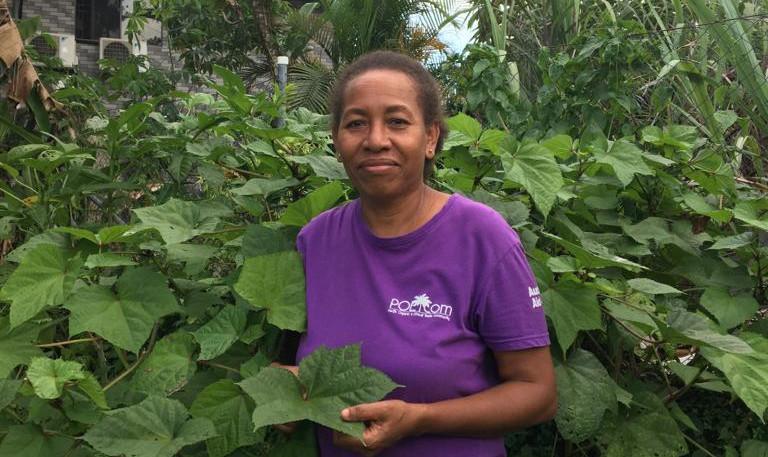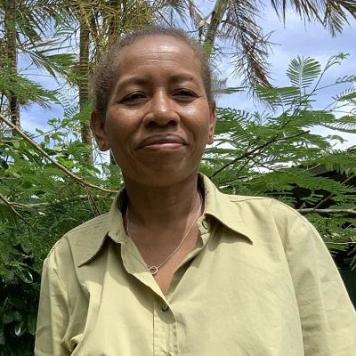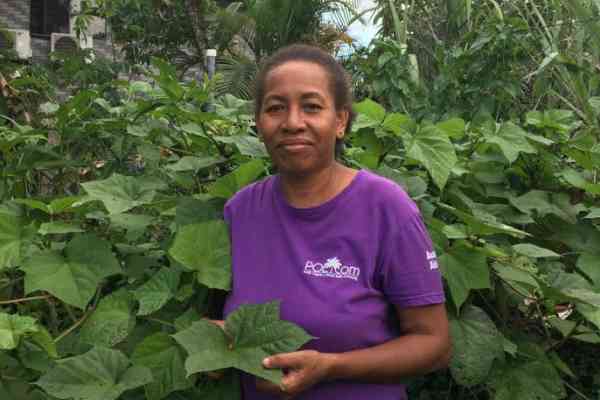Ellen Iramu joined SPC in 2020, continuing a long professional and academic career dedicated to helping countries in her region strengthen their food systems through better soil management. In this blog, she describes her career and the projects she is currently leading in the hope of inspiring more Pacific women to the field. This blog is part of a series dedicated to the collaboration between the Pacific Community (SPC) and Australia’s Department of Foreign Affairs and Trade (DFAT).
I find science to be exciting and fascinating because it helps discover solutions to some of the biggest problems of the world. Some might think that these are impossible to solve, but not me – I am not someone who gives up easily! This is probably why I became a scientist – to solve problems!
I grew up in a rural village in Solomon Islands, so maybe it was only natural that I chose agricultural science as my career path. I took up a scholarship and completed my first degree, and then my second – the interest just kept on building! I discovered that there's no limit to learning when it comes to agricultural science, from soil-related sciences to pest control, there are dozens of disciplines to discover…
After graduating, I worked with the Ministry of Agriculture and Livestock Solomon Islands, in the research department for over 10 years. I also coordinated a project called Integrated Crop Management Package for Sustainable Smallholder Gardens in Solomon Islands - the project was funded by the Australian Centre for International Agricultural Research (ACIAR).
This was my first collaborative experience with Australia and made me want to continue my research, which led me to obtaining a PhD in horticulture at the University of Queensland. Following this, I had the opportunity to work with several Australian agencies, including the Commonwealth Scientific and Industrial Research Organisation (CSIRO) Food and Agriculture and the University of Sydney Plant Breeding Institute. These rich professional and academic experiences ultimately led me to joining SPC in 2020.
At SPC, I work as a soil scientist. Basically, this means that I am looking at the soil, the nutrient levels, nutrient deficiencies – specifically, the biological, chemical and physical properties of the soil. It is important work because crop growth depends on a good soil quality. I also conduct training sessions on soil management in the Pacific Islands project participating countries.
I am currently working on a few projects, some of which are directly funded by Australia. One is called Tuvalu Food Futures, funded by DFAT and promotes the food cube technology for backyard gardening in atolls and urban areas in Fiji. The project has enormous potential, at a time when the reinforcement of food systems is a key regional priority for the Pacific.
I designed a field experiment with another colleague from the University of Tasmania. After developing the field experiment from a theoretical point of view – identifying the right crop varieties and land in relation to the context, we laid out the experiment in the field! I really enjoy fieldwork, but unfortunately, the COVID-19 crisis has slowed down the project. I am hopeful that as restrictions are lifting, 2022 will be the year of Food Cubes!
I really love working on DFAT-funded projects because I get to put my scientific knowledge and skills into practice. With DFAT, we can conduct practical trials in the field, and while not all succeed, we constantly learn. There is also significant support provided on the administrative side of the projects, with our counterparts in Australia making themselves fully available to help us, which is essential to the success of the projects.
I also find it to be quite serendipitous to the career I have built, that I had received scholarships for both my master's degree as well as my PhD, thanks to the support of Australia.
As I look to the future, I think there is a bigger role for Pacific women to play in the scientific world. Today, the sector is mainly made up of men, but I believe that female scientists must encourage young girls to choose this path. It can be challenging of course, but is particularly rewarding, because we are directly helping to build a sustainable future for our region, and for the world.


